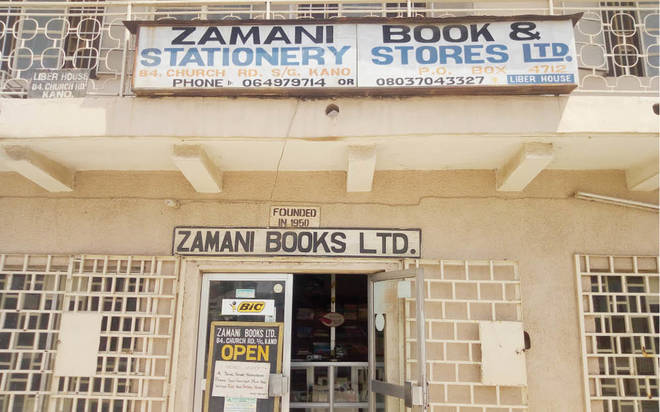
Bookshops used to be busy places in Kano. What happened?
Bookshops in Kano used to be busy places for big business. Aside the fact that people visited to purchase books, it was also a social ground. But now things have changed.
Zamani Bookshop
Once, the pride of every library, be it public or private in Kano State, was the fact that their books were acquired from well-known bookshops. One of such was Zamani Book and Stationary Stores Limited established in January 26, 1950 by late Pa Abraham Amutsaghan Ogbodobri. After the death of the founder, the business was taken over by his son Mr Bernard M. Ogbodobri who has been Chief Executive Officer since 2010.
According to a 71-year-old retired schoolteacher in Kano, Mr. Buwachi Andrew, people patronised Zamani bookshop and other stores the way restaurants or big events are being attended.
“In those years, we looked at the bookshop the way we do international malls, such as UTC and Leventis. Sadly, these once busy centres are now all shadows of what they were. Some of them have since closed down due to poor patronage,” said Mr. Buwachi.
The 58-year-old bookshop is now an old building with virtually no customers apart from the CEO of the place. What used to be a hub of business activities is now as silent as a graveyard.
When asked how he would describe the bookshop business in today’s Nigeria, the Chief Executive said, “You can’t compare two different eras. Nowadays, piracy, economic bottlenecks, the purchasing power of the public and reading culture has become a challenge to live with. Unlike the early period when everyone had to buy his book from a reputable bookshop for quality, the current situation leads sellers to display their wares and sell to the public without caring about the ethics of the business.”
Challenge Bookshop
A visit to the famous Challenge bookshop established by early Christian missionaries in Kano State revealed a similar scenario as that of Zamani bookshop. In the two hours our reporter was in the bookshop, only two customers walked in. Moreover, the bookshop that was known to have a variety of books now has mostly journals and magazines.
Perhaps this is why other bookstores, such as CMS, have closed down their shops in Kano. Others, such as Divine Success Bookshop and Stationeries have gone with the trend and sell what is affordable and easily accessible to the public.
According to Malam Uwais Hamman, a 67-year-old retired civil servant, he had maintained the link between his family and the various bookshops for over three decades because of the standard the bookshops had created for the business. He added that, economic hardship is the major reason behind the decline in patronage. “People still buy books but they prefer the sub-standard ones because they cannot afford those with quality. The bookshops provide good books and the open market provides ‘just books’,” said Malam Hamman.
Another person who spoke to Bookshelf, Umar Sule Wangara, said bookshops now exist as book stalls in every market, and that this proliferation has weakened the bookshop business forcing many operators to hands-off.
“It is apparent that whatever book you need, you can get from the open book market, even if it is of low quality. The purchasing power of the public is very weak and therefore many opt to get their books from the open market. Ironically, many parents nowadays prefer going to the open market to purchase books for their children,” he said.

 Join Daily Trust WhatsApp Community For Quick Access To News and Happenings Around You.
Join Daily Trust WhatsApp Community For Quick Access To News and Happenings Around You.


